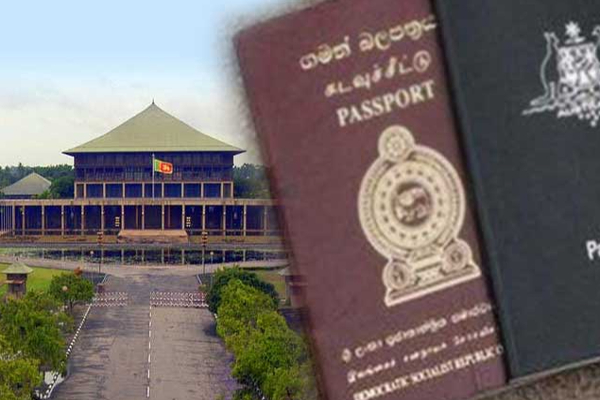While there are talks regarding the removal of MPs with dual citizenship following the passage of the 22nd Amendment to the Constitution, Parliament and the Election Commission (EC) have stated that any decision regarding such MPs should be taken through a judicial process as the matter is beyond their scope.
Speaking to The Morning, EC Chairman and Attorney-at-Law Nimal G. Punchihewa said: “The matter of dual citizens functioning as MPs is beyond the scope of the EC. Having dual citizenship is classified as a disqualification to become a MP, but the EC does not have the power to remove those who are disqualified. They can only be removed through a judicial process. When it comes to the EC, even if we know that an individual is a dual citizen and is handing over nominations for an election, we cannot reject that nomination under the existing laws.”
For instance, he said, although it was known that then-MP and incumbent State Minister Geetha Kumarasinghe was holding dual citizenship, the EC had not rejected her nomination some time ago, and that she had contested the General Election and even entered Parliament. He said that it was through a legal proceeding that her MP position was subsequently abolished. He said that it is clear through the said incident that the EC does not have the power to act in such matters involving dual citizens.
“New legislation should be introduced to enable the EC to reject nominations of dual citizens. Even if such legislation is introduced, it is difficult to know whether someone is a dual citizen unless they declare it themselves. This is because no country reveals personal information about a citizen. With the 22nd Amendment to the Constitution, it should also be looked into whether holding dual citizenship was a disqualification to become an MP at the time of the incumbent MPs’ appointment. All these matters are beyond the EC’s scope,” said Punchihewa.
Meanwhile, when contacted by The Morning, Parliament Assistant Secretary General (Legislative Services) K.A.T.K. Jayathilake said that Parliament is not in possession of information with regard to the MPs’ citizenship. He said that when the EC issued relevant gazette notifications declaring that a person has been elected an MP through an election or the National List, the Parliament accepts such persons as MPs.
“We don’t have any data on the matter of dual citizenship. We usually consider the gazette notification that is issued and then sent to us by the EC after the General Election. It stated that this particular person has become a MP from this electorate, or through a certain political party’s National List. After taking oaths, such persons who have been declared as MPs by the EC can function as MPs. If there is a need to make a decision regarding a MP based on the matter of their dual citizenship status, that has to be done through a court procedure,” he said.
Claiming that there are 10 MPs that hold dual citizenship, Opposition “independent” MP Patali Champika Ranawaka said on 23 October that all such MPs should resign in a respectable manner, given that dual citizens are not allowed to enter the Parliament, in line with the 22nd Amendment to the Constitution, which was passed in Parliament on 21 October. He charged that although there is no issue in persons holding dual citizenship in cases such as bringing in investments, developing business ventures, and providing technical advice, dual citizens should not be allowed to be involved in processes where the people’s sovereign power is exercised.
The 22nd Amendment to the Constitution was passed in Parliament last week with a two-thirds majority. One of the key provisions in the 22nd Amendment to the Constitution is disqualifying dual citizens from contesting elections.


